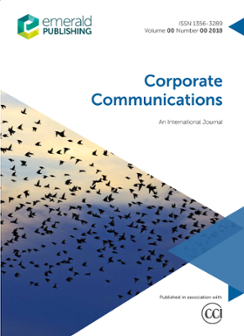Table of contents
Intensions versus actual behavior: undergraduate business ethics course and students' reported workplace behavior
Anthony L. Fulmore, Julia A. Fulmore, Enoch K. AsareThe theory of planned behavior was used as a guiding framework to explore how undergraduate business students, employed full-time, perceived the influence of their first class in…
Conscience-driven corporate social advocacy: analyzing moral conviction and perceived motives as predictors of organization-public relationships
Holly Overton, Anli XiaoThis study examines how congruent moral conviction between an individual and a company impacts organization-public relationships (OPR). Using arguments from the Attribution…
Communicating customer-CSR expectations on corporate websites: an analysis of the banking industry in the United Arab Emirates
Effrosyni GeorgiadouThe purpose of this paper is to explore customer–corporate social responsibility (-CSR) expectations communicated on the corporate websites of the banking sector in the United…
Can corporate–nonprofit partnerships buffer socially irresponsible corporations from stakeholder backlash?
Rong Wang, Amy O'ConnorThis study aims to investigate the complex relationship between corporate–nonprofit partnership characteristics (type, duration and source of communication); attitude toward the…
Firm-serving or public-serving? Analyzing public responses to employee volunteer program communication
Duli ShiDrawing on the elaboration likelihood model, this study aims to examine how employee volunteer program (EVP) type, corporate visual identity, and issue involvement affect external…
Is ethical leadership accentuated by perceived justice?: Communicating its relationship with organizational citizenship behavior and turnover intention
Manisha Seth, Deepa Sethi, Lalit Kumar Yadav, Nishtha MalikThis study aims to analyze the impact of ethical leadership on organizational citizenship behavior and turnover intention of employees working in the financial sector, considering…
Cobbler's kids: public relations reputation among PR students
Jacek BarlikThe purpose of this paper is to find out whether public relations (PR) students feel ready and adequately prepared for their future jobs and how they cope with the reputational…
Board gender diversity and women in leadership positions – are quotas the solution?
Eva Hamplová, Václav Janeček, Frank LefleyThe question has been asked, “Where are the women?” explicitly looking at the public relations (PR) industry, but this is a broader issue reflected in many senior management…
Exploring effects of message framing on supportive behaviors toward environmental corporate social responsibility
Young Kim, Myoung-Gi ChonThe purpose of this study was to shed light on how effective environmental corporate social responsibility (CSR) communication can be achieved through persuasive communication…
How environmental gain messages affect cause involvement, attitude and behavioural intentions: the moderating effects of CSR scepticism and biospheric values
Katja Anna Stadlthanner, Luisa Andreu, Xavier Font, Manuel Alector Ribeiro, Rafael Currás-PérezThis study examines the direct effect of outcome message frames (gain vs loss) on cause involvement and the moderating roles of consumers' corporate social responsibility (CSR…
The framing of plastic pollution responsibility: comparing corporate versus environmental movement discursive evaluations
Silvia Ravazzani, Carmen Daniela MaierThis article aims to investigate evaluative framing of global plastic pollution as discursively performed by two opposed categories of social actors, namely corporations versus…

ISSN:
1356-3289Online date, start – end:
1996Copyright Holder:
Emerald Publishing LimitedOpen Access:
hybridEditor:
- Martina Topic